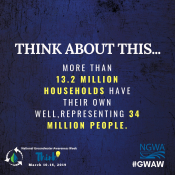Drinking Water
The Drinking Water Program administers and enforces drinking water quality standards for approximately 175 public water systems within Deschutes County. The program provides regulatory and technical services to public water systems to reduce health risks and increase compliance with drinking water standards. The program focuses on preventing water contamination to assure safe drinking water for Deschutes County residents and guests.
Oregon Drinking Water Program Mission
Assure Oregonians safe drinking water by reducing the risk of waterborne disease and exposure to chemical contaminants in drinking water. Carry out that mission by implementing and enforcing USEPA drinking water quality standards at public water systems statewide, and providing related water system regulatory assistance.
Program Goals
Prevent or minimize contamination of public drinking water
Ensure water system personnel have the knowledge, skill and abilities to produce and deliver safe drinking water
Ensure physical facilities are adequate to reliably produce safe drinking water
Ensure all water quality standards are implemented and met
Assist in the education of water users about safe drinking water
Meet EPA National Drinking Water Goals
Interesting facts:
There are 3384 public water systems in Oregon
More than 4.3 million Oregonians are served by public systems
2,426 systems rely on groundwater alone
87 percent of systems serve less than 500 people
400,000 people in Oregon are served by individual private wells
95 percent of Oregonians receive water that meets all EPA standards
Public Water Systems and Novel Coronavirus 2019 (COVID-19)
Frequently Asked Questions from the Oregon Health Authority
RESTORING WATER SERVICE TO BUILDINGS AFTER SHUTDOWN
Concerns have been raised about recommissioning buildings that have been closed, empty or otherwise not in normal service in a way to guard against exposure to Legionella, lead and copper and other contaminants due to stagnant water or low flows. Premise plumbing is not subject to drinking water regulations, but questions may be asked of local public health authorities. Two resources to reference are the CDC Guidance for Building Water Systems and Purdue University’s Center for Plumbing Safety -Restoring Water to Medical, Residential, and Commercial Buildings, Shutdowns, Unsafe Water.
Contact Information:
Jeff Freund, REHS
Jeff.Freund@deschutes.org
(541) 388-6563


